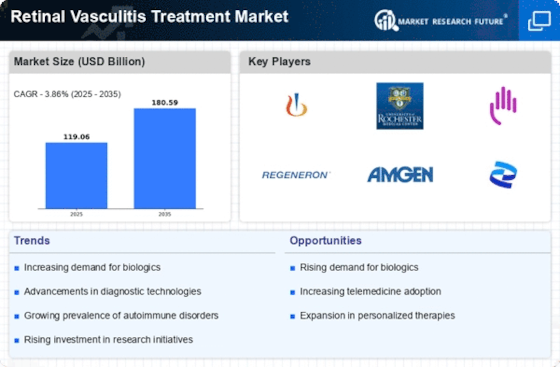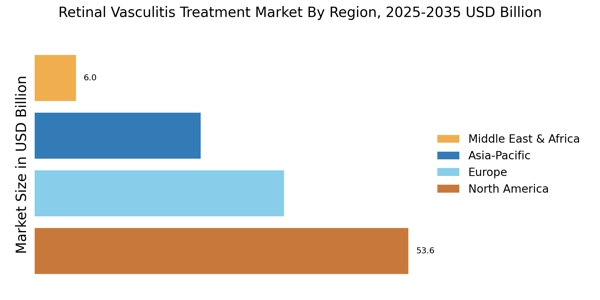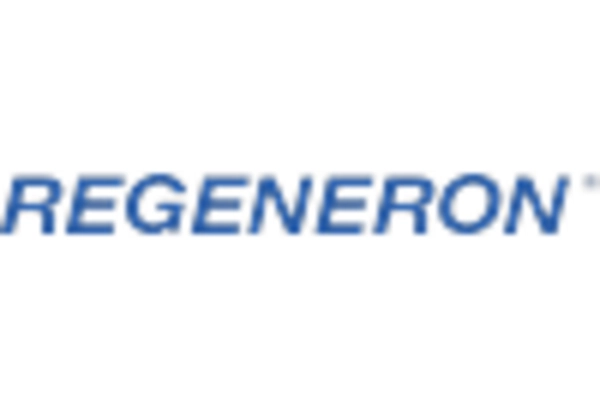Emergence of Targeted Therapies
The emergence of targeted therapies represents a transformative trend within the Retinal Vasculitis Treatment Market. Recent developments in biologic agents and immunomodulatory drugs have shown promise in treating retinal vasculitis, offering more effective and personalized treatment options. For instance, therapies targeting specific inflammatory pathways have demonstrated improved outcomes in clinical trials, suggesting a shift towards more tailored approaches in managing the disease. The market for these innovative treatments is projected to grow, with estimates indicating a compound annual growth rate (CAGR) of over 8% in the coming years. This shift towards targeted therapies not only enhances patient outcomes but also aligns with the broader trend of personalized medicine, which is gaining traction across various therapeutic areas. As more targeted options become available, the treatment landscape for retinal vasculitis is likely to evolve significantly.
Increased Awareness and Education
Increased awareness and education regarding retinal vasculitis are pivotal drivers for the Retinal Vasculitis Treatment Market. Efforts by healthcare organizations and patient advocacy groups to disseminate information about the condition have led to greater recognition of its symptoms and potential complications. This heightened awareness encourages individuals to seek medical attention sooner, resulting in earlier diagnosis and treatment. Educational initiatives aimed at healthcare professionals also play a crucial role in improving diagnostic accuracy and treatment approaches. As more practitioners become knowledgeable about retinal vasculitis, the likelihood of appropriate referrals and treatment recommendations increases. Consequently, the overall demand for effective treatment options is expected to rise, further propelling market growth. The ongoing commitment to education and awareness is likely to foster a more informed patient population, ultimately benefiting the treatment landscape.
Advancements in Diagnostic Techniques
Technological advancements in diagnostic techniques are significantly influencing the Retinal Vasculitis Treatment Market. Enhanced imaging modalities, such as optical coherence tomography (OCT) and fluorescein angiography, have improved the ability to diagnose retinal vasculitis accurately and promptly. These innovations facilitate early detection, which is crucial for effective treatment and management of the condition. As diagnostic capabilities improve, healthcare providers are better equipped to identify retinal vasculitis cases, leading to an increase in treatment initiation. The integration of artificial intelligence in diagnostic processes may further streamline patient assessment, potentially increasing the number of patients receiving timely interventions. Consequently, the growth in diagnostic accuracy and speed is likely to drive the demand for various treatment options, thereby expanding the overall market.
Rising Incidence of Retinal Vasculitis
The increasing prevalence of retinal vasculitis is a notable driver for the Retinal Vasculitis Treatment Market. Recent studies indicate that the incidence of retinal vasculitis has been on the rise, with estimates suggesting that it affects approximately 1 in 100,000 individuals annually. This growing patient population necessitates the development and availability of effective treatment options. As awareness of retinal vasculitis expands among healthcare professionals and patients alike, the demand for specialized treatments is likely to increase. Furthermore, the correlation between retinal vasculitis and systemic diseases such as lupus and vasculitis syndromes may contribute to a higher diagnosis rate, thereby propelling the market forward. The need for targeted therapies that address both the ocular and systemic aspects of the disease is becoming increasingly apparent, which could lead to innovations in treatment protocols.
Growing Investment in Research and Development
Growing investment in research and development (R&D) is a significant driver for the Retinal Vasculitis Treatment Market. Pharmaceutical companies and research institutions are increasingly allocating resources to explore novel therapeutic options and improve existing treatments for retinal vasculitis. This trend is underscored by the recognition of the unmet medical needs within this patient population, prompting a surge in clinical trials aimed at evaluating new drugs and treatment protocols. The financial commitment to R&D is expected to yield innovative solutions that address the complexities of retinal vasculitis, potentially leading to breakthroughs in treatment efficacy. Furthermore, collaborations between academia and industry are likely to enhance the pace of discovery, fostering an environment conducive to rapid advancements. As investment in R&D continues to grow, the treatment landscape for retinal vasculitis is poised for significant evolution.

















